Trending ADHD Papers
Visual Abstract
Computerized cognitive training in attention-deficit/hyperactivity disorder (ADHD): a meta-analysis of randomized controlled trials with blinded and objective outcomes
Meta-analysis of Computerized Cognitive Training in ADHD
December 9, 2024
author
Westwood SJ, Parlatini V, Rubia K, Cortese S, Sonuga-Barke EJS
journal
Molecular Psychiatry
Date Published
undefined undefined undefined
Why link to a visual abstract?
What is a visual abstract?
Original
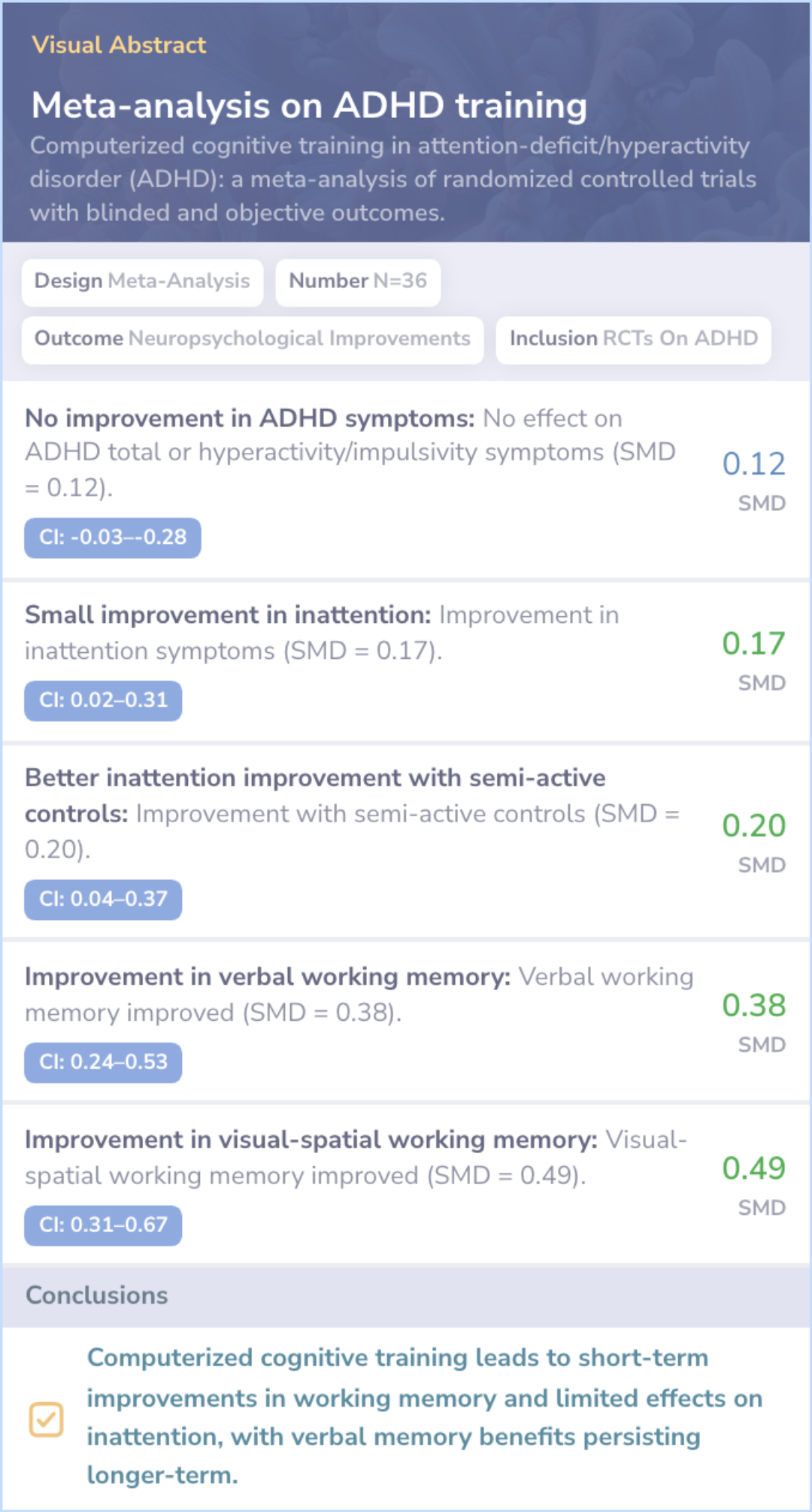
Study Summary
🔬
What They Studied
The study investigated the effects of computerized cognitive training on various outcomes in individuals with ADHD.
💡
What They Found
The research found small improvements in inattention symptoms and working memory but limited benefits for other outcomes.
📚
What This Means
These findings suggest that while computerized cognitive training offers some benefits, particularly for inattention and working memory, its effects may be limited and settings specific; it adds to older research by comparing outcomes specifically in ADHD contexts.
Study Overview
Background & Objectives
Attention-deficit/hyperactivity disorder (ADHD) is a common condition treated with medications like methylphenidate, which increases norepinephrine and dopamine. However, some explore non-pharmacological options.
This study investigates computerized cognitive training (CCT) as an alternative or complement to medication. It aims to evaluate CCT's effects on clinical symptoms, neuropsychological capabilities, and academic outcomes in ADHD cases.
This study investigates computerized cognitive training (CCT) as an alternative or complement to medication. It aims to evaluate CCT's effects on clinical symptoms, neuropsychological capabilities, and academic outcomes in ADHD cases.
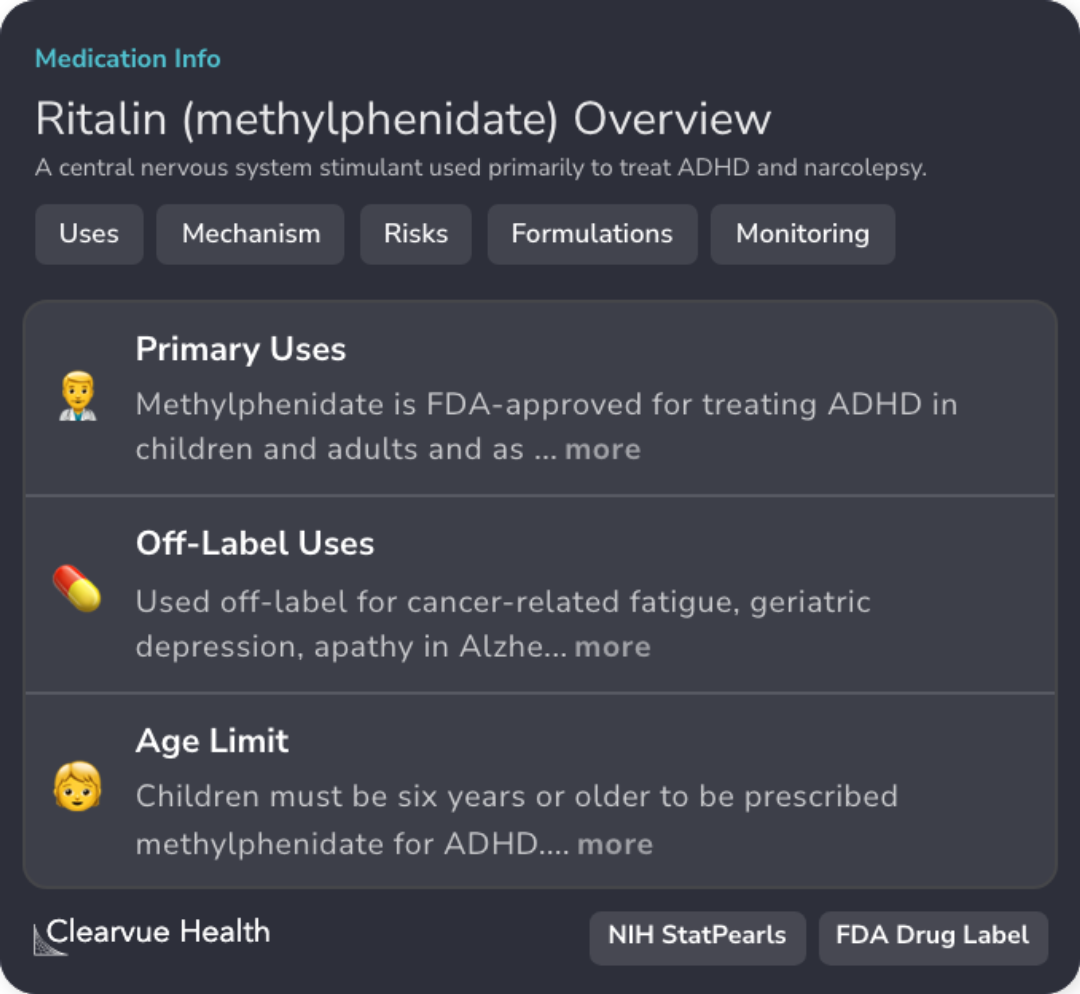
Abstract: background
This meta-analysis investigated the effects of computerized cognitive training (CCT) on clinical, neuropsychological and academic outco...more
Study Summary
Methods
Researchers conducted an extensive search through databases like PubMed and Web of Science, targeting studies up until January 2022. They looked specifically for randomized controlled trials (RCTs) involving CCT for ADHD individuals.
The trials were evaluated for quality using reliable risk assessment tools. In total, 36 RCTs were analyzed, 17 of which directly studied working memory training (WMT).
The trials were evaluated for quality using reliable risk assessment tools. In total, 36 RCTs were analyzed, 17 of which directly studied working memory training (WMT).

Abstract: methods
The authors searched PubMed, Ovid, and Web of Science until 19th January 2022 for parallel-arm randomized controlled trials (RCTs) usin...more
Study Results
Results
The study found no significant impact of CCT on overall ADHD or hyperactivity symptoms immediately post-treatment, though there was a slight improvement in inattention symptoms.
Improvements in working memory were noted, especially in verbal and visual-spatial areas, yet effects on general cognitive skills or academics were limited. Long-term benefits were primarily observed in verbal working memory and executive function, albeit in few studies. The setting of the intervention appeared to influence inattention outcomes.
Improvements in working memory were noted, especially in verbal and visual-spatial areas, yet effects on general cognitive skills or academics were limited. Long-term benefits were primarily observed in verbal working memory and executive function, albeit in few studies. The setting of the intervention appeared to influence inattention outcomes.
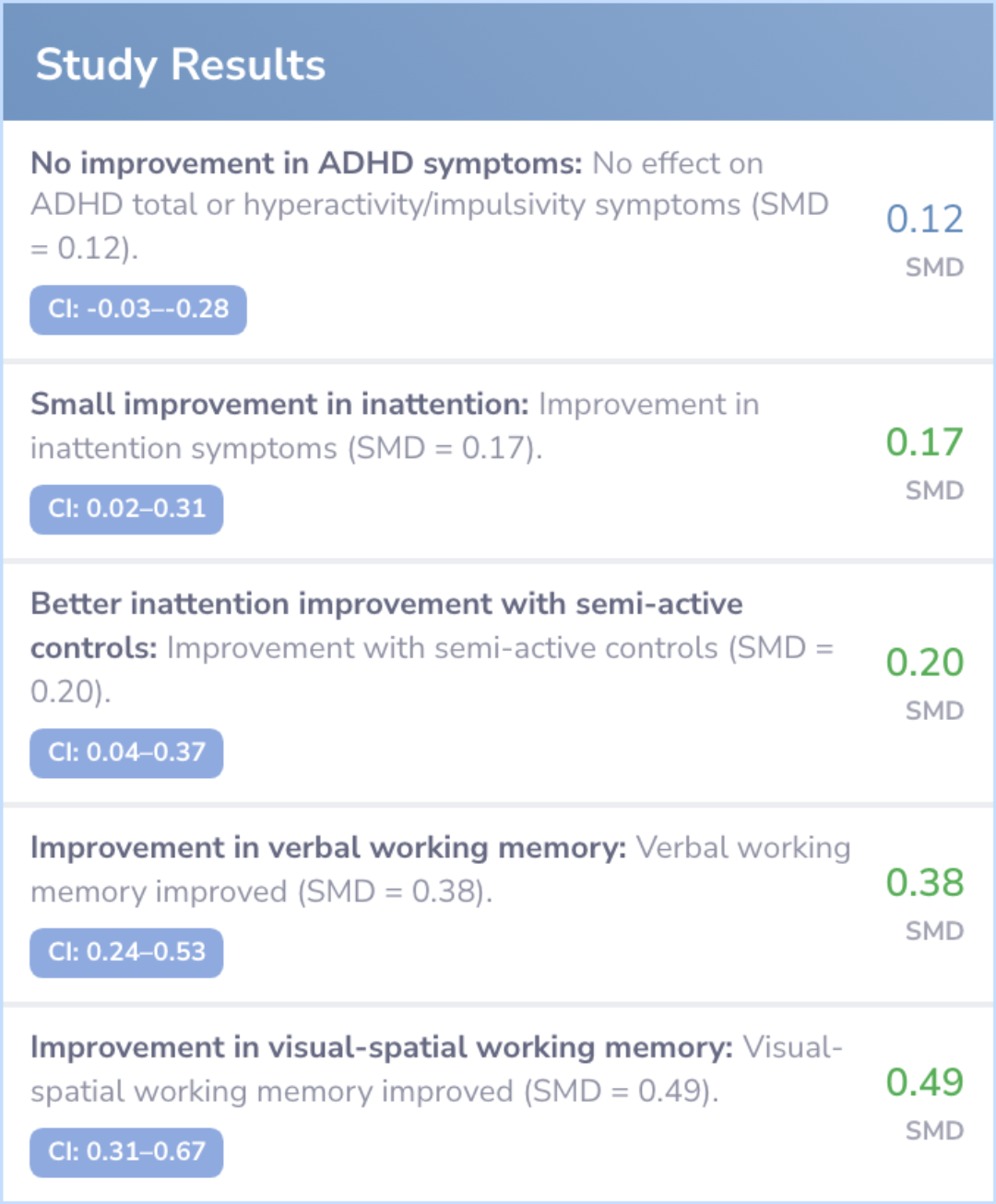
Abstract: results
Analysis of outcomes measured immediately post-treatment and judged to be "probably blinded" (PBLIND; trial n = 14) showed no effect on...more
Study Summary
Conclusions
Computerized cognitive training showed short-term improvement in working memory, particularly in verbal skills, with some signs of maintaining this over time.
The training's clinical benefits were minimal, mostly evident in small, specific settings with brief effects on attention. Overall, CCT didn't show a wide-reaching impact across various cognitive and academic measures for ADHD management.
The training's clinical benefits were minimal, mostly evident in small, specific settings with brief effects on attention. Overall, CCT didn't show a wide-reaching impact across various cognitive and academic measures for ADHD management.
Abstract: conclusions
In sum, CCT led to shorter-term improvements in WM, with some evidence that verbal WM effects persisted in the longer-term. Clinical effects were limited to small, setting specific, short-term effects on inattention symptoms.
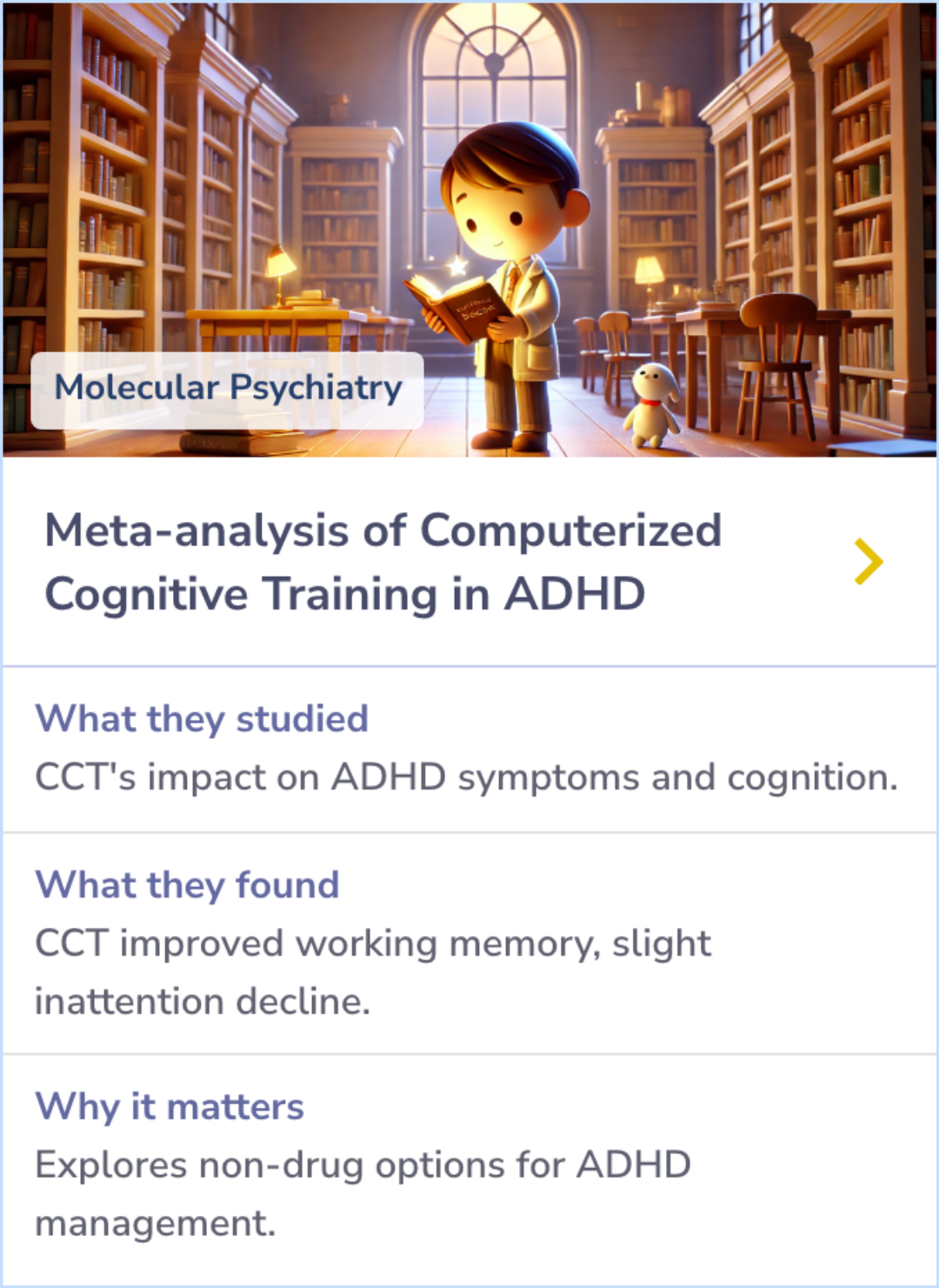
Clinical Guidelines
Guidelines suggest that screening for comorbid conditions like anxiety or developmental disorders is important in ADHD evaluations.
Additionally, psychosocial treatments involving home and school coordination may improve outcomes.
Behavioral therapy combined with medication offers benefits for managing ADHD symptoms in children.
Additionally, psychosocial treatments involving home and school coordination may improve outcomes.
Behavioral therapy combined with medication offers benefits for managing ADHD symptoms in children.
Literature Review
Westwood et al, 2023
Core Insight:Both papers explore the impact of computerized cognitive training on ADHD, showing minimal improvements in overall ADHD symptoms except for a small, setting-specific effect on inattention.
What It Adds:
Methodological Consistency: Both papers have identical methods, confirming stability of conclusions.
General Findings: Both papers report limited effects on ADHD symptoms.
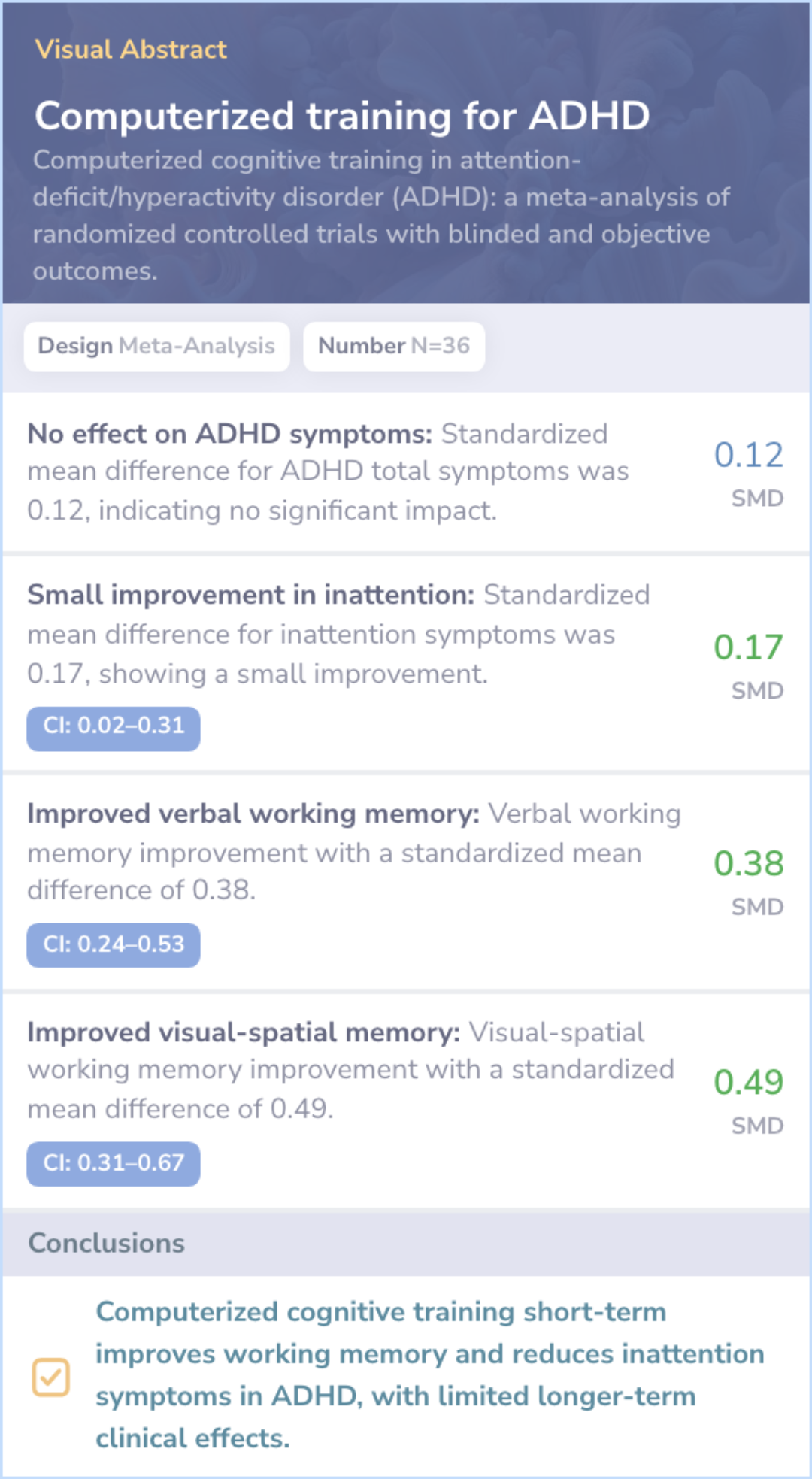
Literature Review
Cortese et al, 2015
Core Insight:Both papers explore cognitive training in ADHD but highlight different outcomes. The primary paper found modest short-term improvements in working memory and inattention, while the comparison paper noted mixed ADHD symptom effects based on assessment blinding, emphasizing potential enhanced outcomes from multi-target approaches.
What It Adds:
Assessment Blinding Impact: Comparison highlights effect size change based on rater proximity.
Multiprocess Benefits: Comparison suggests targeting multiple deficits may enhance outcomes.
Shared Themes:Both studies affirm limited impact of cognitive training on ADHD symptoms, noting improvements in working memory but differences in symptom rating affected by bias and training variety.
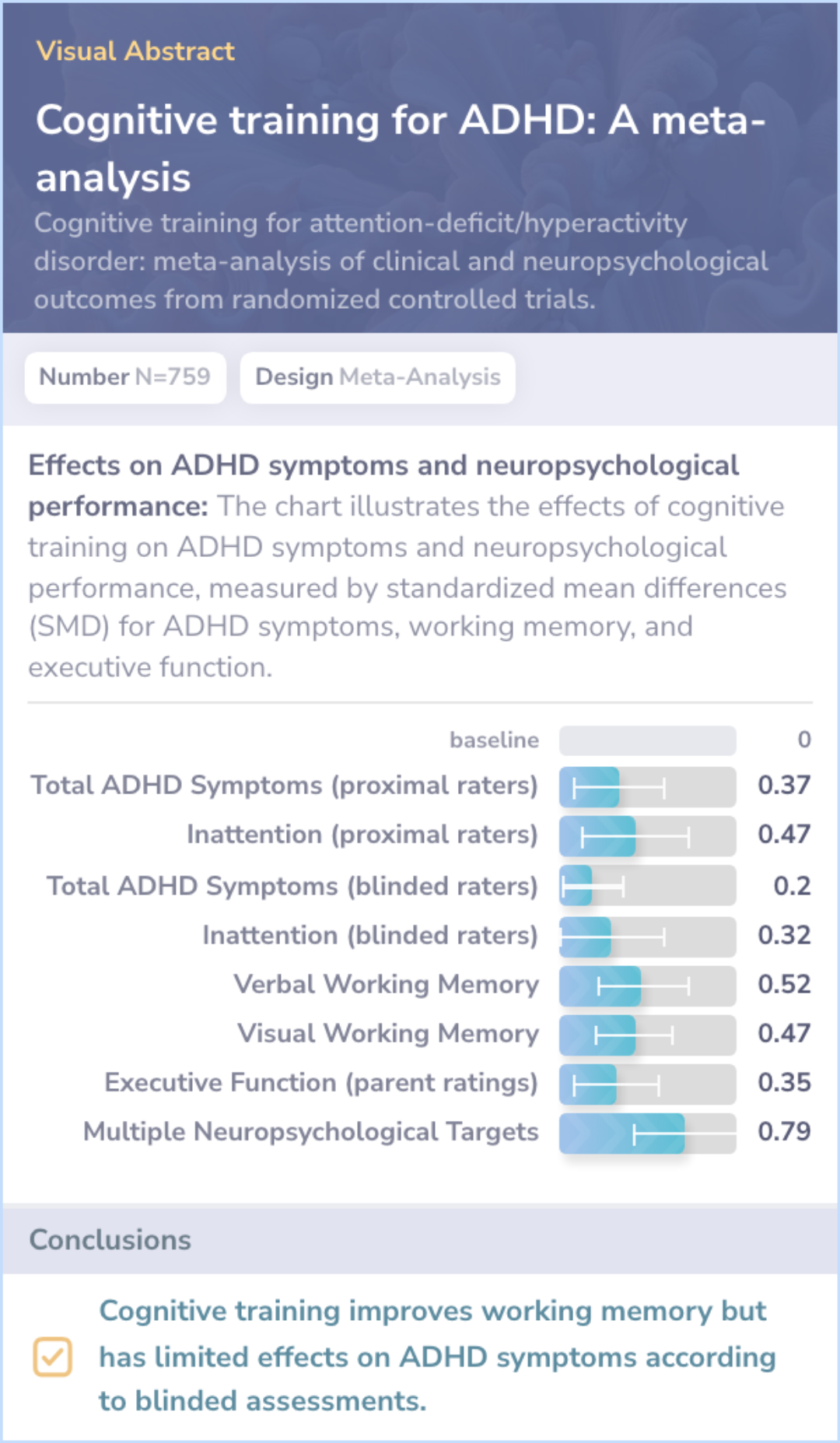
Literature Review
Zhu et al, 2023
Core Insight:The comparison paper finds physical exercise significantly helps alleviate ADHD symptoms and improve executive functions like memory and attention in children and adolescents, a focus distinct from the computerized cognitive training explored in the main paper.
What It Adds:
Exercise and Symptoms: Physical exercise can reduce hyperactivity and inattention.
Exercise and Functions: Exercise improves executive functions, showing broader benefits.
Shared Themes:Both papers investigate non-pharmacological strategies for ADHD, focusing on interventions to improve symptoms and cognitive functions.
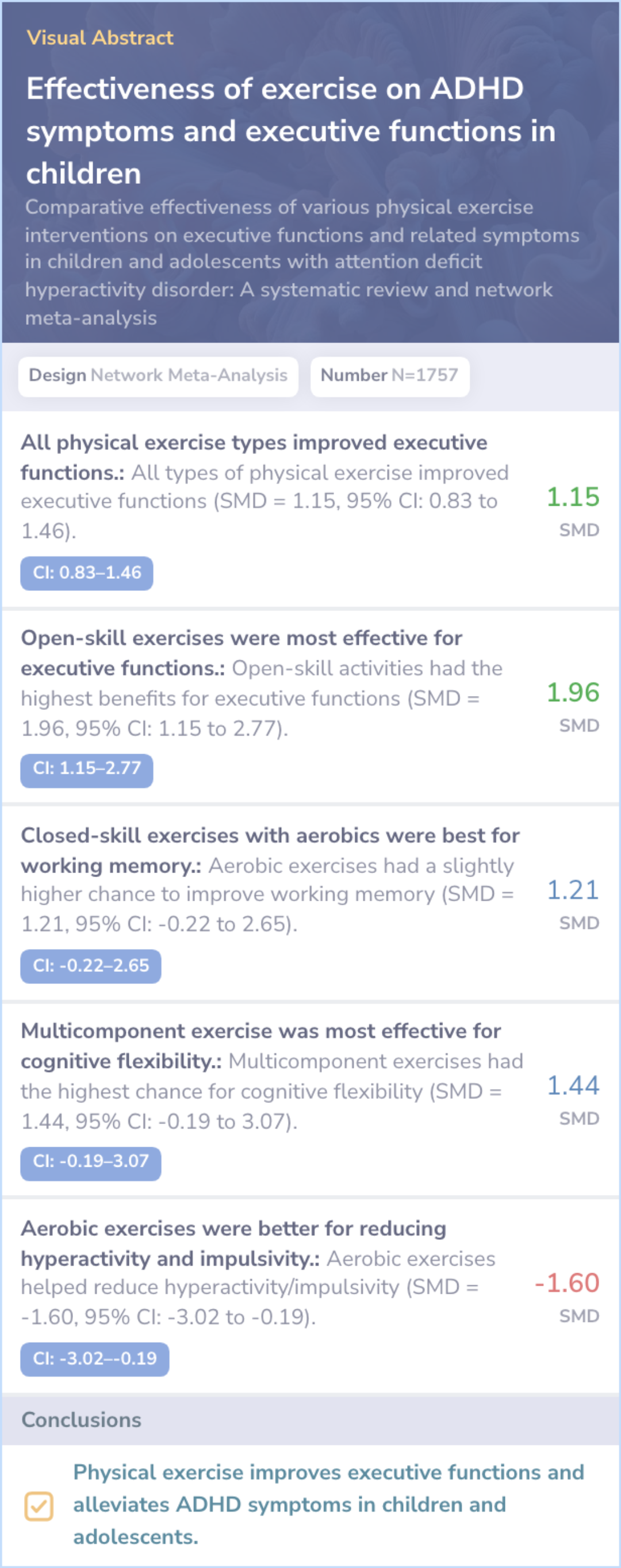
Literature Review
[Cortese] et al, [2023]
Core Insight:The comparison paper finds no significant support for neurofeedback treating ADHD when using probably blinded outcomes, aligning with the main paper's finding that computerized cognitive training yields limited effects on ADHD symptoms.
What It Adds:
Different Interventions: Examines neurofeedback rather than computerized cognitive training.
Study Scope: Analyzes trials for children and adolescents, similar to main paper.
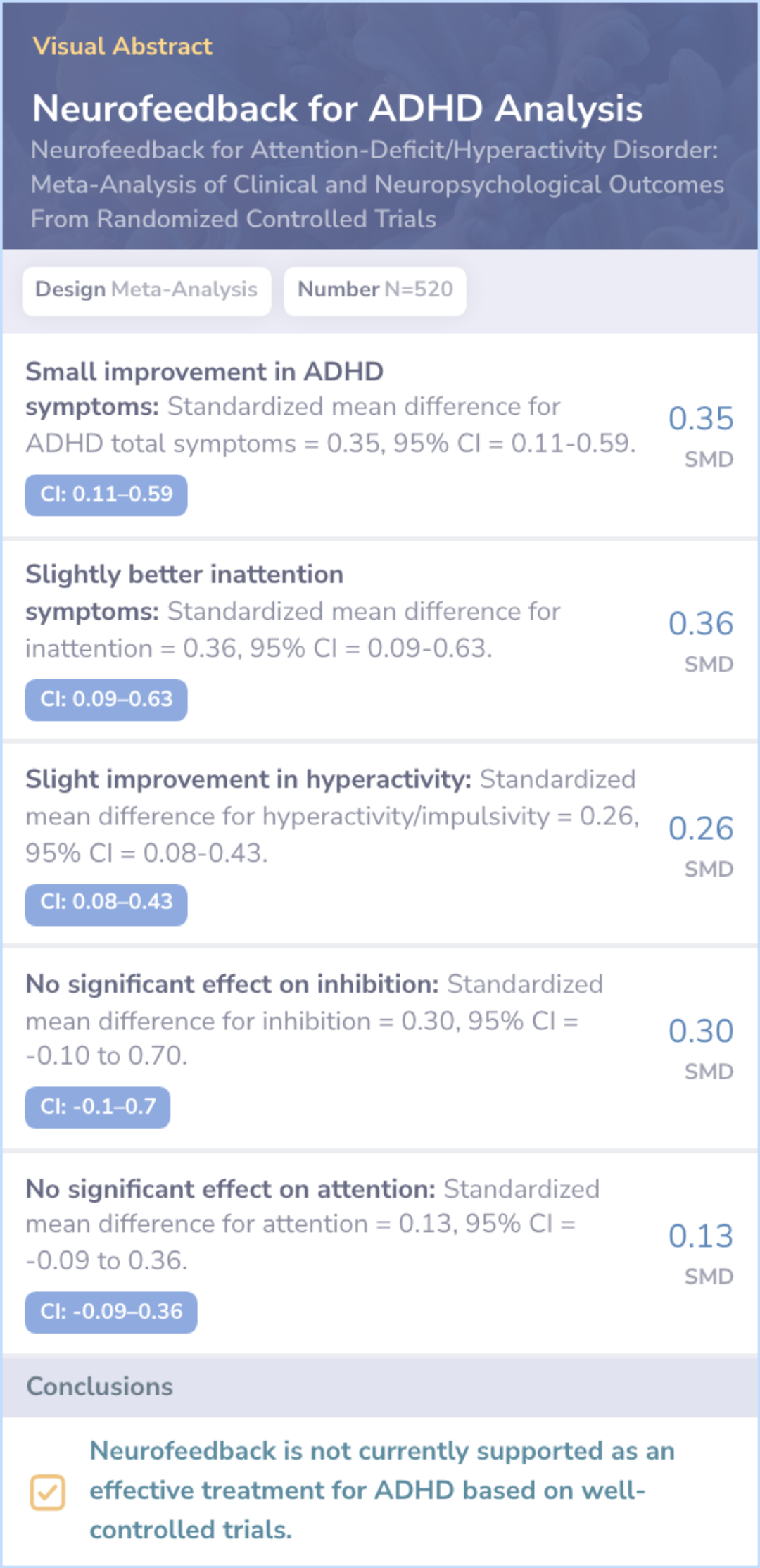
Literature Review
[Cortese] et al, [2023]
Core Insight:The comparison paper finds no significant support for neurofeedback treating ADHD when using probably blinded outcomes, aligning with the main paper's finding that computerized cognitive training yields limited effects on ADHD symptoms.
What It Adds:
Different Interventions: Examines neurofeedback rather than computerized cognitive training.
Study Scope: Analyzes trials for children and adolescents, similar to main paper.
